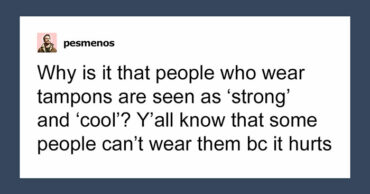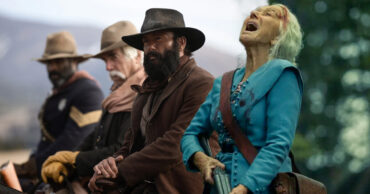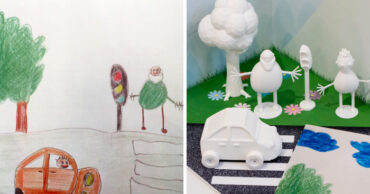
Ask and ye shall receive: Shedding the excess fat of flashback scenes that have done little in the way of making the present of Vinyl any more urgent, “The Racket” is fully immersed in the here and now. With that lack of narrative restriction, a lot of story winds up with more time to breathe on-screen, even as minutes are sucked by other odd choices. Vinyl is pretty much Vinyl at this point, so it’s perfectly fine to have made up your mind about whether or not it’s for you; and because of that, there’s no point rehashing the “murder plot is really dragging this down overall,” because it is what it is. What matters now is how the different storylines develop in their own contexts, and “The Racket” shows that at least a couple carry their weight with ease.
The offices of American Century are at their busiest in this hour, with the Nasty Bits, Hannibal, Lester Grimes and other artists occupying its waiting rooms and executive suites. The chaos works pretty well at establishing a sense of place–what a day at the job feels like for the lower-downs–but the whole twister of acts serves the purpose of putting Lester back into Richie’s orbit as the new manager of the Nasty Bits. These two characters absolutely have to interact regularly to continue making Vinyl compelling, because it’s the series’ strongest dynamic, and this is among the smartest moves to force that going forward. With the lingering bitterness Lester holds towards Richie and his company, it just wouldn’t have been believable for Lester to be cooperative about giving up more of his time without the autonomy that he establishes for himself in this episode. Richie is certainly resistant, but it’s easy to see how much he respects Lester, and how that will define the relationship for as long as it lasts.
Critical noise has also been made about Juno Temple’s Jamie, and while this definitely isn’t her strongest episode thus far, she remains at the heart of what Vinyl is trying to do with its ideas of the self-made businessperson. Not even an integral part of A&R, Jamie has been more successful at living up to Richie’s standards than anyone else, and she does it by feel rather than adhering to some kind of equation or checklist that likely defines a lot of these companies’ departments. There’s also her not-really-relationship with Kip, the frontman the Nasty Bits, and that’s been handled well by virtue of how free-spirited both characters are, not anchoring either to a need to be complete from a partner.
In fact, Vinyl doesn’t have many positive things to say about romance at all, with Devon going to see a lawyer about a potential divorce. I had thought taking pictures of the home wreckage in last week’s episode had more to do with satisfying an artistic itch, but here, they’re used as part of what the lawyer identifies as a piece of leverage for Devon. Apparently, she doesn’t come off as someone who genuinely wants to separate from the person she loves, but she’s definitely being pushed farther in that direction because of Richie’s selfishness, fed by falling off the cocaine wagon. The frying pan breaking the window is a powerful image given Devon’s dismissiveness in the earlier therapy session, and even though this is another plot strand that’s not really working for me, Olivia Wilde sells it well. The problem is mostly that it’s so tangential, both story-wise and thematically, to most of everything else going on in Vinyl, but I’m sure I’d be clamoring for more family-related scenes if it wasn’t a part already, so…hypocrisy from the reviewer.
As alluded to earlier, with the absence of flashback sequences, “The Racket” has to find other ways to fill its time, which is absolutely a challenge it ought to have presented itself with. But the extended Hannibal music scene is…not exactly the best use of time. This is the issue with a series so intensely attached to music as a device that gives it life. And the episode, which features Pink Floyd’s “Money” and The Who’s “Won’t Get Fooled Again,” is getting much better at montages. But the live music aspect has felt a little bit cumbersome, and I wonder if that comes down to Mick Jagger saying “Hey, let’s show a live act for a while to establish that concert atmosphere” and everyone else saying “Yeah!” without realizing that you can’t really get away with that without making the scene meaningful (emphasizing debauchery, making the aesthetic experience mimic a frame of mind that the point-of-view character is in–plenty of options). Instead, it’s kind of just there, and you’re left wondering when it’s going to end so that something else can happen. It’s not like it’s put together poorly or anything (quite the opposite), but Vinyl already evokes its world well enough without needing to establish it like this. That leaves a distinct craving for something a little tighter, writing-wise, even as the scripts are getting better.
B-Sides:
- Still not sold on these dreamlike sequences in which someone is singing in an angelic-like empty room (this one opens the episode, transitioning into the funeral).
- Not that it needed to be said explicitly, but Richie and Devon’s marriage is predicated on a no-drugs policy.
- The rest of the executives have a car ride in which they get to moan at each other about how inconvenient life is. I like seeing these guys act with each other, but it doesn’t really amount to much? The illegal copies of albums and the financial hardships they’re facing haven’t really made for poignant moments yet. We’re better off spending more time with Jamie and the A&R people.
- Richie goes to see his father (?) for an alibi. This has been the best development of that side of Vinyl thus far.
 Follow Us
Follow Us






Visitor Rating: 3 Stars